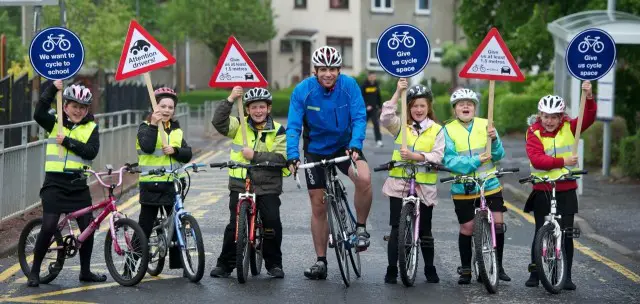Scottish round-the-world cycling legend Mark Beaumont has been involved in a campaign to ask drivers across Scotland to give children the space they need to cycle to school.
Mark, whose previous adventures have involved avoiding rabid dogs and cycling through the effects of dysentery as he travelled the world, joined a group of children from St Mark’s Primary School in East Renfrewshire hoping to catch drivers’ attention with placards highlighting how drivers can help their quest for safer cycling routes to school.
With summer fast approaching, the ‘Give Me Cycle Space’ campaign aims to break down the biggest barrier to kids riding their bikes to school – parents’ fear of busy roads – by making motorists more aware and considerate of child cyclists.
The campaign will be centred around local schools to promote ‘Cycle Friendly Zones’ – areas where drivers are asked to give children as much space as possible so they can make an easy and safe journey by bike. The six week campaign will include outdoor advertising, leafleting to parents and advertising on local radio.
Coordinated by Cycling Scotland, the campaign will take place in seven areas of Scotland; Glasgow, Inverclyde, Aberdeenshire, Argyll and Bute, Moray, Perth & Kinross and East Renfrewshire and hopes to encourage more children to get on their bikes for a healthier, fitter lifestyle. Schools in each of the areas will receive a visit from The Riderz, Scotland’s stunt cycling team, in a bid to show children cycling to school can be fun and exciting.
Mark Beaumont said “I believe the Cycle to School campaign is invaluable for children. Research shows that children want to cycle to school, so the aim of this campaign is to make sure drivers look out for them. This will give more children in Scotland the confidence to get on their bikes and cycle to school.”
Cycling Scotland Chief Executive Ian Aitken commented: “The Give Me Cycle Space campaign achieved incredible results last year, contributing to huge increases in the number of children cycling in the schools we targeted. In some areas we saw levels of cycling to school double, for example in Orkney the percentage of kids riding their bikes to school rocketed from 9% to 18%.
“I think the mixture of strong communication to drivers, supported by children getting their cycle training really gives parents the confidence to let their kids start using their bikes to get to school.”
Schools in Scotland are being encouraged to provide Bikeability Scotland cycle training to help children learn skills on the road, in a real-life cycling environment. The training teaches children key skills such as manoeuvring, checking for danger and carrying out risk assessments effectively. In addition, Government funding is allowing for more and more cycle paths to be developed. The provision of bike sheds in schools and 20 mph zones around schools, has also helped ensure both the safety of children cycling to school and the security of their bikes.
What’s more, schools can also be awarded for their commitment to cycling under the Cycle Friendly Schools award scheme which recognises schools that provide good facilities, incentives and promotion for children cycling to school. There are currently 89 schools that have been awarded Cycle Friendly School, this equates to some 22,552 pupils, in 24 local authorities. Find out more about the scheme at www.cyclingscotland.org.
Comments (1)
Leave Reply
Post Comment


All very worthy, but (and sorry to be cynical) I suspect all completely pointless.
This isn’t the first time we’ve seen campaigners try to ask drivers to ‘be a bit nicer please’ and the results are predictably dire. Remember the ‘3 Feet Please’ campaign? Cycling Scotland appear to be doing nothing more than trying to convince kids and parents that their fear of traffic is all in the mind. This is the basic tenet of most cycle campaining (a la CTC etc) and it is a demonstrable failure.
If we want to make cycling to school safer, money needs to be spent making safe infrastructure and reducing the speed and number of cars on the roads. Anything else is just hot-air.
As for figures on Orkney ‘rocketing’ to a miserable 18%, just how many cars are there on the island of Orkney, compared to the rest of the country? Can this island really be compared to, say Aberdeen or Edinburgh, where the number of school pupils presumably numbers in the thousands?
I’m sure Mark Beaumont means well, but if he really wants to make a difference, perhaps he should be campaigning for real ‘concrete’ changes to Scotland’s roads, rather than this nice, fluffy, but ultimately futile (and I’ll bet my Singletrack subsription that it is futile) poster campaign.